#The London Musical Theatre Orchestra
Explore tagged Tumblr posts
Text
SEGA announces two debut Sonic Symphony World Tour events in London and Los Angeles

SEGA announced a new Sonic Symphony World Tour series, with tour dates scheduled this September in London, UK and Los Angeles, CA.
It's a follow-up to the the iconic 30th Anniversary presentation in 2021, and last year's Brazil Game Show performance ahead of the release of Sonic Frontiers.

Tour dates
The London presentation will be held at the Barbican Hall, while Los Angeles will host its presence at the Dolby Theatre. Doors will open at 7:00 pm local time, and the show will begin an hour later.
16 September 2023 at the Barbican Hall in London, UK.
30 September 2023 at the Dolby Theatre in Los Angeles, CA.
Ticket sales for each event begin 26 May 2023 at 10:00 am local time, and newsletter subscribers can grab pre-sale tickets on 25 May.
What to expect
Expect an immersive "musical journey through the colorful world of Sonic the Hedgehog," with "classic 8-bit and 16-bit tunes to rock and EDM songs."
Relive your favorite Sonic moments, brought to life by a full symphony orchestra. Sonic Symphony will be an electrifying tribute to the music that has defined generations of gamers, old and new.
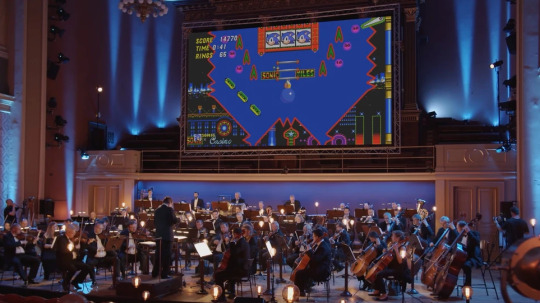
Why "two cities" for a world tour?
The company characterized the two events as "debut performances", though it was reassured that more events are expected to appear in 2024.
Meanwhile, a mailing list on the official website invited people to "find out when [the Tour] is coming near you."
While it isn't clear if Sonic Symphony will be coming to other countries, this is certainly something Sonic fans will want to keep their eyes very open.
230 notes
·
View notes
Text
Gershwin & Miss Swift
BBC Radio 3, Sunday 22 December 8pm GMT
Drama on 3
The extraordinary true story of composer Kay Swift and her ten-year love affair with George Gershwin.
Before Taylor Swift, there was Kay Swift – her distant relative, and another unique game-changing musician. Kay became the first woman to score a hit Broadway musical. When Kay meets George, sparks fly. But Kay is happily married with children, and George is only truly faithful to his creative talent. A psychoanalyst adds fuel to the fire. Kay chooses to forge her own future – in love and music – risking everything along the way.
Written by Andrew McCaldon and recorded live in front of an audience at the Alexandra Palace Theatre, London with Swift and Gershwin’s music performed by the BBC Concert Orchestra with singer Lucy-Anne Daniels and pianist Ben Dawson. The conductor is Keith Lockhart.
Kay Swift ….. Lydia Leonard George Gershwin ….. Jamie Parker Jimmy Warburg ….. Jacob Fortune-Lloyd Gregory Zilboorg ….. Joseph May Ellen Swift ….. Tara Ward
Directed by Tracey Neale
Producers - Tracey Neale and Neil Varley
With special thanks to Katharine Weber, Aaron Gandy, and the Kay Swift Trust.
7 notes
·
View notes
Text
wip of my drarry ballet au fic. Inspired by The Red Shoes and Black Swan. This first scene is pretty much the opening scene in The Red Shoes.
P.S. Eat dirt, Joanne.
The excitable chatter of the barely contained line of people fill the street, the sidewalk slick with rain reflecting the warm yellow glow of London. Standing at the foot of a door are two men, shouting out for calm to the rabble of young folks eagerly awaiting for the door to open. Harry, Ron, and Hermione tuck their umbrellas underneath their arms as the line surges forward briefly, a few angry shouts of line cutting behind them that seem to settle as quickly as it had begun.
“See, told you it was a good idea to come two hours early,” Hermione boasts, smiling at Ron and Harry, who are taking the brunt of the pushing line behind them.
“We are forever in your debt, oh wise one,” Ron bows, tipping dangerously forward as someone knocks into him, “watch it!”
There is no build up or warning to the doors opening, but the line still surges forward as if a gun had gone off at the races. The doormen quickly step out of the way as the line scrambles inside and up the stairs, people pushing and jockeying for a better position. Ron holds Hermione’s hand as Harry sprints up ahead, bursting through the doors, stepping over chairs to get to the balcony of the dress circle and laying himself out to save two extra seats.
“Move it!” A tall brunette orders, slapping at Harry’s scuffed dress shoes just as Ron and Hermione arrive, filling the seats.
“Sorry, early bird and all,” Harry smirks, earning a blustering scowl from the brunette and their partner.
“Mum packed us food,” Ron smiles, producing three baking paper lined sandwiches from his large brown coat, “Ham and cheese for ‘Mione and a bacon butty for Harry.”
“God save Molly Weasley,” Harry laughs, biting into the perfectly cooked bacon.
“Programmes?” An usher calls out.
“Two here thanks!” The brunette answers, grabbing two programmes from the usher's hand.
“One here,” Harry stands, taking one of the programmes from the brunette “thank you!” Which earns another round of scowling and muttered swears from the couple.
“Professor Lockhart's music better be good, we’ve spent nearly half of our rent for these tickets,” Ron grumbles as they look over the programme, taking a swig from a bottle that also comes out of his coat.
“Delacour would be able to dance to anything, even if the music is awful,” the brunette says happily.
“Dela-who?”
“Come now,” the brunette laughs, “you cannot have been standing in that line for two hours waiting to see her dance-”
“Not to see anybody. To hear.” Harry interrupts, finishing off his sandwich in two big bites.
“Look,” he continues, brandishing the opened programme in front of the couple, “it says here, composer Gilderoy Lockhart.”
“Have you heard of him?” Hermione asks, a little bite in her politeness that makes Ron smile adoringly at her.
“Never.”
“You will,” Ron says through his now finished sandwich, taking off his coat and hanging it over the balcony.
“He’s our Professor at the Royal Academy of Music,” Hermione informs happily, grabbing the bottle from Ron and taking a long pull.
“So Del-whatever better be good,” Ron side-eyes.
The brunette, now red in the face, opens their mouth to say something just as the orchestra begins to fine tune their instruments.
“Oh! There he is!” Hermione gasps, pointing out towards one of the private boxes closest to the stage.
“Oi! Lockhart!” Harry and Ron bellow together laughing as Lockhart, a handsome fellow with golden curls and a flamboyantly gray and pink suit, smiles up at them and gives them a little wave.
“He must be blind if that's the suit he's wearing,” the brunette laughs before being promptly shushed by the seats behind them as a settled silence moves through the theatre.
The string section fades in, a soft dolce accompanied by a pianissimo, with light touches of pizzicato from the violins. Harry closes his eyes to the melody and theme of the piece, letting it wash over him. It feels like a memory, the music gentle and quietly melancholic, like something he had heard once in a dream. No. No he had heard this before, had hummed the melody in the brittle hours of the morning in his first year at the Academy, had poured over the piano and ink until he dreamt in musical notations.
“Harry, isn't that your string piece from first year?” Ron whispers and Harry can only nod in reply.
“What? It must be a coincidence, right? Lockhart wouldn't lift it, surely,” Hermionie tries to reason, sounding less than convinced even as she says it.
Harry shrugs noncommittally, even when the cold bite of betrayal sinks its teeth into his stomach, and tries to focus on the ballet instead. It has to be a coincidence. Has to be.
The dancers float across the stage on pointe, the muscle in their legs straining while their faces maintain a soft serenity, even under the hot stage lights. Harry had not danced since he was thirteen, but he remembers the hours of practice to maintain a pirouette, the sweat and unhinged strive for perfectionism. He does not envy them. Going into music was the best thing he ever did.
A fanfare of trumpets and the sudden commotion of a battaglia, discordant and heavy, rips Harry from the dancers and back to the music.
“That's yours too, isn't it Harry?” Hermione whispers, but from the furrow on her brow she already knows the answer.
Lockhart stole his music, bits, and pieces of his soul taken apart and repurposed. His eyes naturally fall over to Lockhart, who is just sitting there, enjoying the ballet, enjoying Harry’s music. He wants to scream, to tell everyone that Gilderoy Lockhart is a talentless hack, but Ron has a firm, reassuring grip on his shoulder. Instead, he gets up and pushes past the brunette and their partner without a second to apologize, while Ron and Hermione quickly follow behind him, apologizing profusely as people scowl and complain behind them.
-
“Harry, you can’t just break into Lockhart’s office, you’ll get expelled before you even have a chance to explain why,” Hermione reasons, taking a large gulp of her beer, “besides, we don’t know for sure if he had intended to steal your music or if he just used it for inspiration.”
“Inspiration? Come on, I bet that lousy moron has stolen heaps of students works,” Ron bristles, downing the rest of his beer in one large gulp, “I bet there are heaps of people with the same story as yours that just never brought it forward because Lockhart is famous and ‘respected’.”
In the center of Hog’s Head, a student pub at the corner of Baker and Bickenhall Street, Harry nurses his beer and seethes, Hermione and Ron both encouraging and discouraging his more reckless tendencies in equal measure.
“Ok, so I won’t break into his office,” Harry concedes, plucking a couple of hot chips from the shared bowl in the middle of the table, “but he has stolen my work, note for note. Ron is right, there has to be other students that he’s done this to as well.”
“Maybe you could write a strongly worded letter to Lockhart-”
“A letter?” Ron laughs, “To Professor Gilderoy Lockhart, you stole my music. Fuck you! Sincerely, Harry James Potter.”
“Ok, well how about the director?” Hermione asks, finishing off her beer.
“What director?”
“Of the ballet. I'm sure he would appreciate knowing that the music he was using was stolen,” Hermione smiles, before getting up and going to the bar.
“I'm going to marry her one day, Harry.”
9 notes
·
View notes
Text
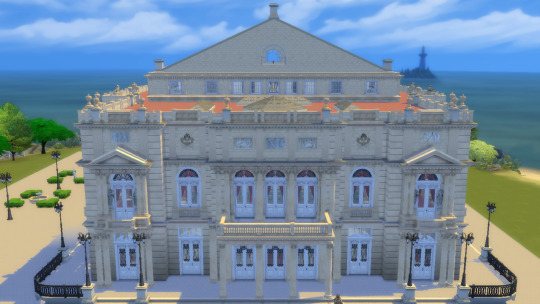
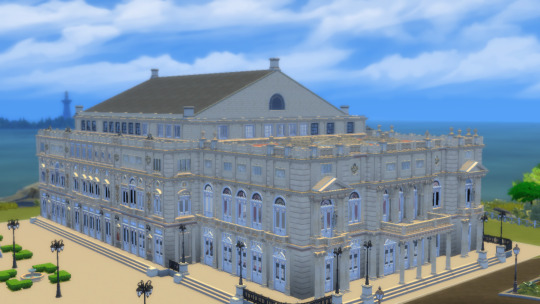


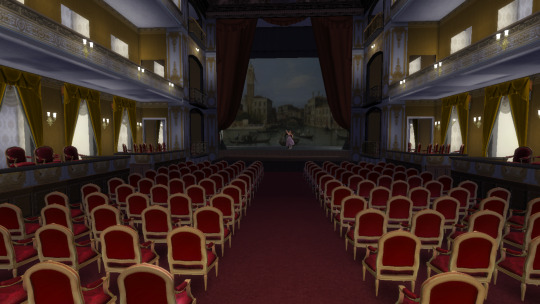
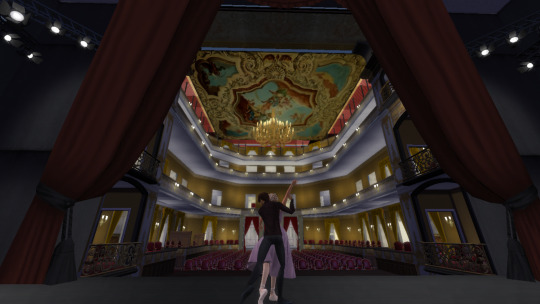
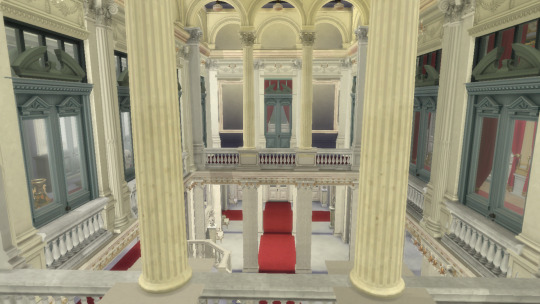
Colon Theatre
The Teatro Colón in Buenos Aires is one of the most important opera houses in the world. Its rich and prestigious history, as well as its exceptional acoustic and architectural conditions, place it on par with theaters such as La Scala in Milan, the Paris Opera, the Vienna State Opera, Covent Garden in London, and the Metropolitan Opera in New York.
In its first location, the Teatro Colón operated from 1857 to 1888 when it was closed for the construction of a new venue. The new theater was inaugurated on May 25, 1908, with a performance of Aida. Initially, the Colón hired foreign companies for its seasons, but starting in 1925, it had its own resident companies - Orchestra, Ballet, and Choir - as well as production workshops. This allowed the theater, by the 1930s, to organize its own seasons funded by the city's budget. Since then, the Teatro Colón has been defined as a seasonal theater or "stagione," capable of fully producing an entire production thanks to the professionalism of its specialized technical staff.
Throughout its history, no significant artist of the 20th century has failed to set foot on its stage. It is enough to mention singers such as Enrico Caruso, Claudia Muzio, Maria Callas, Régine Crespin, Birgit Nilsson, Plácido Domingo, Luciano Pavarotti, and dancers like Vaslav Nijinsky, Margot Fonteyn, Maia Plisetskaya, Rudolf Nureyev, and Mikhail Baryshnikov. Esteemed conductors such as Arturo Toscanini, Herbert von Karajan, Héctor Panizza, and Ferdinand Leitner, among many others, have also graced the theater. It is also common for composers, following the tradition initiated by Richard Strauss, Camille Saint-Saëns, Pietro Mascagni, and Ottorino Respighi, to come to the Teatro Colón to conduct or supervise the premieres of their own works.
Several top-notch maestros have worked consistently here, achieving high artistic goals. They include Erich Kleiber, Fritz Busch, stage directors like Margarita Wallmann or Ernst Poettgen, dance masters like Bronislava Nijinska or Tamara Grigorieva, and choral directors like Romano Gandolfi or Tullio Boni. Not to mention the numerous instrumental soloists, symphony orchestras, and chamber ensembles that have offered unforgettable performances on this stage throughout over a hundred years of sustained activity.
Finally, since 2010, the Teatro Colón has been showcased in a restored building, resplendent in all its original splendor, providing a distinguished setting for its presentations. For all these reasons, the Teatro Colón is a source of pride for Argentine culture and a center of reference for opera, dance, and classical music worldwide.
__________________________________________________________
You will need a 64x64 lot and the usual CC from TheJim, Felixandre, Harrie, Sverinka, SYB, Aggressivekittty, and other marvelous creators!
DOWNLOAD TRAY: https://www.patreon.com/user?u=75230453
(free to play 7/17)

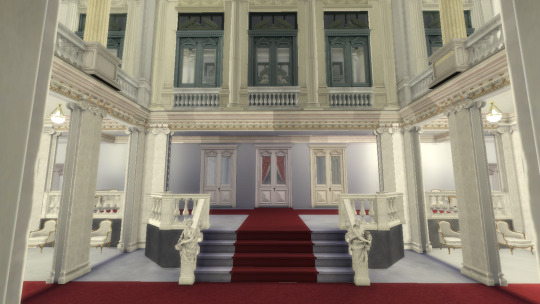
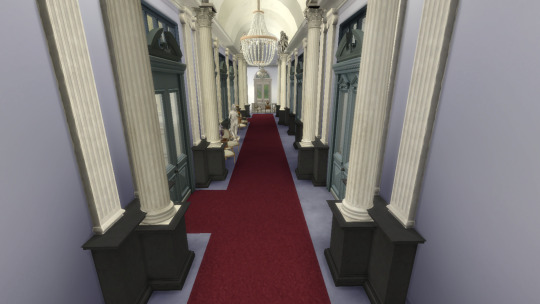
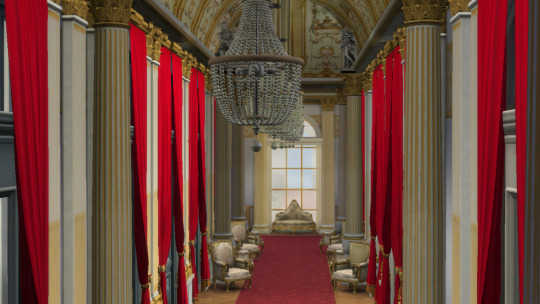


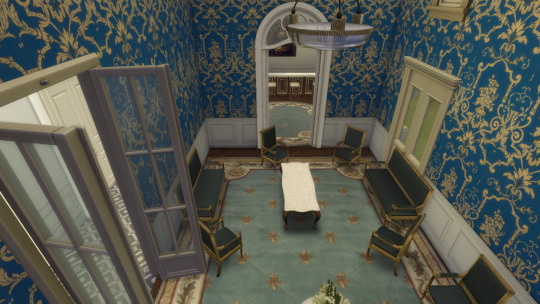
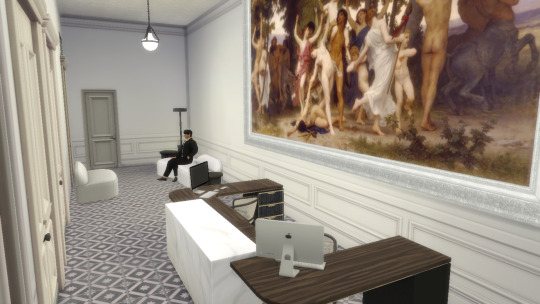




#sims 4 architecture#sims 4 build#sims4palace#sims 4 screenshots#sims4#sims4play#sims 4 historical#sims4building#sims 4 royalty#sims4frencharchitecture
73 notes
·
View notes
Text

Alexander Knaifel
Russian composer whose sparse musical landscapes create a spiritual ambience of meditative calm
Alexander Knaifel, who has died aged 80, did not set out to be a composer. As a student in the 1960s, he studied the cello with Mstislav Rostropovich until injury intervened. Then he redirected his energies towards composition, at a time when the Khrushchev thaw could accommodate the musical modernism of the Soviet Union’s second avant-garde period (the first having come in the years around the 1917 revolution).
But the cello retained a significant role in Knaifel’s output. Rostropovich went on to commission and premiere three religious works that reflected both Knaifel’s adoption of Russian Orthodox Christianity around 1970 and his conviction, which appealed to Rostropovich, that experience can be heightened by performers thinking – “silently intoning” – a text as they playe the music.
Chapter Eight – Canticum Canticorum (The Song of Songs, 1993), a work “for church, choirs and cello”, unfolds slowly over the course of an hour. With three a cappella choirs adopting a cross formation in Washington National Cathedral in the US, the premiere was recorded for the Teldec label and released under the title Make Me Drunk With Your Kisses (1995).
The Fiftieth Psalm (1995) is for solo cello. Psalm 50 in the Orthodox numbering is Psalm 51 in the west: Miserere/Have Mercy. With his concern for “playing as if singing”, Knaifel felt that “only Rostropovich could articulate this text”, and his recording of it was released on the ECM label in 2005.
Blazhenstva (1996) is a meditation on the Beatitudes, Jesus Christ’s sermon on the mount. Rostropovich’s last cello student, Ivan Monighetti, later recorded it with Knaifel’s wife, Tatiana Melentieva, as the soprano soloist with the State Hermitage Orchestra from St Petersburg for another ECM release.
That 2008 recording also features Monighetti playing a piece in the modernist style that preceded Knaifel’s more ethereal approach, his Lamento for Solo Cello (1967, revised 1986). Built upon serialist tone rows, and with a striking approach to timbre and performance techniques, it is also highly expressive.
From the same period came his Monody for Female Voice (1968), again written in a modernist style, with modal phrases juxtaposed with glissandi descending in quarter-tones and wide intervals. Premiered by Melentieva, it was written with her crystal-clear tone and extensive vocal range in mind.
Knaifel first made his mark with the opera The Canterville Ghost, given a semi-staged student production in 1966, at the end of his studies at the Leningrad Conservatory. Based upon the humorous ghost story by Oscar Wilde, it was taken up by the Kirov Orchestra under Alexander Gauk in Leningrad in 1974 and the BBC Symphony Orchestra under Gennady Rozhdestvensky in London in 1980. A 1990 recording with Michail Jurowski directing the Moscow Forum Theatre, reissued on Brilliant Classics in 2012, brings out the young composer’s confident delivery of musical humour and mastery of orchestration.
In Knaifel’s more ascetic and contemplative works, solo lines and single sustained pitches are spun out over long durations – sometimes over the course of two hours – almost to the point of stasis. In the more minimalist language of what he called his “quiet giants”, he was ahead, among Soviet composers, of either Giya Kancheli or Arvo Pärt, in presenting pared-down content that is rich in spiritual ambience. There is no obvious parallel to Knaifel’s music in the west, although it bears some similarity in style to that of the American composer Morton Feldman.
Of two large-scale works from the 1970s, Knaifel said: “In Jeanne, I discovered the number, in Nika, the word.” He reworked a Joan of Arc ballet into Jeanne, Passion for 13 Instrumental Groups (1978), a work of extreme asceticism drawing on the principle that the universe is built on numbers and proportions with rational and symbolic power, while Nika, 72 Fragments for 17 Performers on Bass Instruments (1974), was the first of his works to use unspoken texts.
Agnus Dei for Four Instrumentalists A Cappella (1985), with a characteristically paradoxical title, is powerful in impact given its sparse musical landscape and the sense of meditation that this creates. It utilises a wide range of literary examples, ranging from the liturgical to quotations from the diary of a young girl, Tanya Savicheva, who died during the siege of Leningrad.
These texts, printed in the score as well as in the audience’s programme notes, are never heard in performance, with the musicians being instructed to “think the text” as they play. Knaifel maintained that the word does not needed to be explicitly stated for the work’s spiritual intention to be understood.
His compositions of the 1990s and beyond increasingly displayed a religious aesthetic and an even more ascetic musical language. Texts both secular and sacred were present, but, in line with the Gnostic tradition, Knaifel asserted that “truth” must be hidden and revealed gradually to the listener in order for it to have validity.
This approach found its fullest and most original expression in In Air Clear and Unseen (1994), for texts by Fyodor Tyutchev, piano and string quartet, with its extremes of register, periods of silence, silent intonation, religious symbolism and virtuosic performance techniques. A recording by the pianist Oleg Malov and the Keller Quartet was released on ECM in 2002.
Knaifel’s opera Alice in Wonderland, premiered in Amsterdam in 2001 with a cast including the baritone Roderick Williams, has a libretto based upon Lewis Carroll’s narrative. But the text is rarely sung, instead being either mimed, or even in a few instances, coded visually, through coloured lights playing on a backdrop on stage.
Born in Tashkent, Uzbekistan, Alexander was the son of Russian-Jewish parents: his father, Aron Knaifel, a violinist, and his mother, Muza Shapiro, a music theory teacher, had been evacuated from Leningrad at the time of the siege. From the Leningrad Central Music School (1950-61) he went on to the Moscow Conservatory, where his cello studies under Rostropovich were ended by a nerve inflammation in his left hand. At the Leningrad Conservatory (1963-67) he studied composition with Boris Aparov, a student of Shostakovich.
In 1979, Knaifel was blacklisted by the Soviet authorities as one of the “Khrennikov Seven”, including Edison Denisov and Sofia Gubaidulina, following the premiere in Cologne of his improvised piece A Prima Vista (1972), attracting the ire of Tikhon Khrennikov, leader of the Union of Composers of the USSR.
Knaifel turned his attention to writing film scores, written in a more conventional idiom. There were 40 in all, including those written for his frequent collaborator, the Russian director Semyon Aranovich.
Working with the composer on preparing a number of written texts for publication led me to appreciate his childlike sense of wonder alongside his warmth and playful sense of humour. This sense of a child’s world was apparent in both the Alice opera and its predecessor, the surrealist song cycle A Silly Horse (1981), of which a recording by Melentieva and Malov was reissued on the Megadisc label in 1997.
Knaifel married Melentieva in 1965. She survives him, along with a daughter and a grandson.
🔔 Alexander Aronovich Knaifel, composer, born 28 November 1943; died 27 June 2024
Daily inspiration. Discover more photos at Just for Books…?
9 notes
·
View notes
Text
GROUP: Classical music

Highlights from the Ballet - Tchaikovsky's The Nutcracker - Bolshoi Theatre Orchestra (1966)
^this was a record i randomly found in my closet when we were moving out, and I had no idea where it came from. I play it every Christmas.
Franz Berwald Symphony in E flat - London Symphony Orchestra (1968)
Middle row: Bach Brandenburg Concerti No. 1-6 - Württemburg Chamber Orchestra (1968)
The Halle Orchestra - Tchaikowsky's Symphony No. 6 in B Minor & Symphony No. 5 in E Minor (unknown years, probably sometime between 1964-67)
GROUP: Vintage OSTs

The Salsoul Orchestra - Christmas Jollies (1976)
Technically not an OST i guess but it was definitely a soundtrack of my childhood, as this orchestra was very popular in Guyana and my family plays this album everyyy holiday season without fail.
Richard Rodgers - The Sound of Music OST (1967)
Scenes From Gershwin's Porgy And Bess (1963)
This is another record my mom gifted me and I'm not sure why bc I can only tolerate opera when I'm listening to it live. Still a cool thing to have I guess and it's the oldest record in my collection currently.
#Vinyl#vinyl records#vinylcommunity#vinyl collection#60s#1960s#Vintage#classical music#Opera#johann sebastian bach#tchaikovsky#porgy and bess#Salsoul orchestra#70s#my collections
5 notes
·
View notes
Note
Now that you've seen both the London (via video) and Watermill productions, which one do you think is better?
To me, this sounds like, 'Which one is better, Child 1 or Child 2?', but I'll do my best to answer your question appropriately.
If you define 'better' as more successful from a financial aspect or reviewed more positively by critics, the answer is quick and easy: the Watermill Theatre's production is better. The West End production was nominated for four Olivier Awards and received a fairly good review by the Guardian, but overall, the production didn't sell well and closed at a loss. The Watermill production became massively popular during the run and sold out its final weeks of performances, went on to win several audience choice awards, and was recognised nationally and internationally for its contribution to theatre and accessibility to the extent that it's now being revived by a well-known theatre in the US.
If you're asking me which production I like better, it gets complicated.
The West End production has been in my life since 2015, I've listened to the cast recording a thousand times, I've been collecting everything I can find, from bootlegs to merch, my passion for it has been recognised by multiple cast members and creators to the extent that I've been sent a house-cam recording and rehearsal footage of it - the West End production and its predecessor are all there was until last year. To me, it's still the embodiment of the Lord of the Rings musical.
The Watermill production, however, is the one I got to see live, in person, TWICE, together with some of my dearest online friends as part of a trip I'll remember fondly for the rest of my life. I got to take pictures with cast members and took part in a workshop, I watched people fall in love with the show, I saw the rise of a LOTR MUSICAL FANDOM, something I'd always dreamt of. This production was fresh and new and different, and it was so brilliantly done that it exceeded all expectations. How can you not love it?
I adore both productions more than I ever could express, and I couldn't say which one is BETTER, which one I like more. Those who got into it after seeing the Watermill production might not understand why I cling to the old version so much, but nostalgia is a very strong factor here. It also depends on what you're looking for in a show.
The Watermill production is small and intimate, a cast of 20 actor-musicians who all play multiple roles and instruments. It's extremely immersive and is adapted according to weather and cast. The costumes are cute and practical. YOU are in the story.
The West End production is grand, with a massive cast and orchestra that sing and play the beautiful score to its fullest, a set that extends into the theatre, and breathtaking choreography that includes stilts, silks, and tap - a spectacle. It's immersive, but not overly much.
Both feature largely the same script and songs. They're two facets of a glorious adaptation, and I could not choose one over the other as I love both so very dearly. I am immensely happy about the Watermill's success, that this will be the version that travels around the world and vows audiences and gathers new fans - because this one *works*. The Hobbit version will live on, and there couldn't be a lovelier production to travel to Middle-Earth with.
13 notes
·
View notes
Text

'Evenin', everyone...Mr. Baggins back with you, with a set to soothe your achin' nerves and help ease us all into a good night. We start this evening off with Lenny and the NY in their classic 1967 complete recording of Borodin's "Polovstian Dances" from Prince Igor, the ballet music from Gounod's "Faust", Dance of the Hours from Ponchieli's "La Giocanda", the Dance of the Tumblers (!) from Rimsky Korsakov's "The Snow Maiden", the Bachanalle from Saint-Saens' "Samson et Dalila", the dances from Verdi's "Aida", and finallyj, the waltz from Tchaikovsky's "Eugene Onegin".
I thought it might be interesting to hear the VERY FIRST recording of Gershwin's "Rhapsody In Blue", with Gershwin at the piano, recorded in Aeolian Hall, June 10, 2024: This is a 100-year-old recording! You will notice right off that the delivery is MUCH DIFFERENT, much much JAZZIER than the way it is played today! There was much more of a yawning/laughing/growling "HOT JAZZ" kind of phrasing to the horn lines and to everything else that is just not there in modern performances, which attempt a very "European Classical" feel...it's really quite eye-opening!
youtube
Since we're back here in the 1920s, let's take in Sir Edward Elgar's first recording of his "Enigma Variations", recorded in Royal Albert Hall, with Elgar himself conducting, in April and August 1926.
youtube
Next we turn to the music of a teen-aged Chopin, his Variations in B-flat on "Là ci darem la mano" from Mozart's "Don Giovanni" for piano and orchestra, Op. 2. The London Philharmonic Orchestra is conducted by Eliahu Inbal, and our pianist is the great Claudio Arrau.
youtube
Here's another little treat from the world of opera, we hear Bruno Walter conducting The Columbia Symphony Orchestra in a studio recording made in Hollywood in 1961, in several Mozart opera overtures. We hear the overtures to Der Schauspieldirektor K.486, Così fan tutte K.588, Le nozze di Figaro K.492, and Die Zauberflöte K.620. Sit back and listen to A Master conduct Mozart!
youtube
Next we hear the Paris Wind Ensemble in music of Haydn, his Divertimento in B-flat for Flute, Oboe, Clarinet, Horn and Bassoon. Taken from a rare 1958 recording released on Epic, which we know as more of a pop/rock/soul label.
youtube
Staying with Haydn for moment, we hear another historic recording, this one by The London Baroque Ensemble, directed by conductor Karl Haas, in this 1954 recording of Haydn's Scherzando in F major. This is another "classical" recording made on a mostly pop label, this time Westminster.
youtube
We're going back to 1926-38 for this next little while, as we hear legendary violinist Fritz Kreisler playing his favorite encore pieces, with pianists Carl Lamson and Franz Rupp. Fritz Kreisler is another performer whose style of playing is no longer considered "fashionable" or "correct". I love his tone, myself...it's like honey!
And we wind up this evening's program with the delightful Wind Sextet, Op. 201 of Carl Reinecke, written in 1904. It is performed for us here by Soni Ventorum Wind Quintet, recorded live, 16 February 1980, Meany Theatre.
youtube
And that's all the time we have for this evening's program, I do hope you've enjoyed the selections and possibly heard something new to your ear. This is Mr. Baggins signing off for tonight, I'll return at 8am Pacific with our Morning Coffee Music.
Until then, dream sweet dreams, babies, dream sweet dreams.
Baggins out.
youtube

6 notes
·
View notes
Text
Fuck it- here are my favorite albums and EPs
-The Normal Album by Will Wood
-April Fools (2021) by The Scary Jokes
-Build a problem by Dodie
-Theatre is Evil by Amanda Palmer and the Grand Theft Orchestra
-Blood Bunny by Chole Moriondo
-Bad Ideas by Tessa Violet
-Puberty 2 by Mitski
-Coyote Stories by The Crane Wives
-TOYBOX by Creep-P
-Big Dumb Idiot by Tom Cardy
-O My Heart by Mother Mother
-zero_one by The Living Tombstone
-Transgender Street Legend, Vol. 2 by Left at London
-A Picture Perfect Hollywood Heartbreak by Zach Callison
-Catterpillars of the Commonwealth by Will Connolly
-Human by Dodie
-Sleepyhead by Cavetown
-recently by Liana Flores
-Punch by Autoheart
-Coffee and Ramen by Go! Child
-De Reconstruct by Penny Parker
-Hazards by Penelope Scott
-The Black Parade by My Chemical Romance
-Danger Days by My Chemical Romance
-In case I make it by Will Wood
-Self-Ish by Will Wood and the Tapeworms
-BURN PYGMALION!!! A Guide To Better Guide To Romance by The Scary Jokes
-Nerdy Prudes Must Die (Original Cast Recording) by Starkid
-going..going...GONE! by Hemlocke Springs
-I'm Too Sensitive For This Shit by Hayley Kiyoko
-t.i.a.p.f.y.h by Left at London
-Fanfare by Dorian Electra
-My Agenda by Dorian Electra
-The Secret To Life by FIZZ
-Retinal Bloom by The Scary Jokes
-the Fox and the Bird by Ok Goodnight
-The Rise and Fall of a Midwest Princess by Chappell Roan
-THE POST-TRAUMATIC MANIFESTO by Weevildoing
-CHASER by femtanyl
-DAEMON/DOLL by various vocaloid producers ft; Kasane Teto
-My Brain the Musical by R.I.P.
-Mysteries for Rats by Penelope Scott
-Hot Mess by dodie
-Fun and Games by Mega Mango
-My Love is Sick by Madds Buckley
-The Land is Inhospitable and So Are We by Mitski
-Spirit Phone by Lemon Demon
-Pop Food by Jack Stauber
-Evelyn Evelyn by Evelyn Evelyn (Amanda Palmer and Jason Webber)
-Wasteland Baby by Hozier
-Scoundrel Days by a-ha
-Bando Stone and The New World by Childish Gambin
-Sorry For The Late Reply by Sløtface
-Try Not To Freak Out by Sløtface
#music#ill update this as i inevitably gain more favorite albums and eps#i literally cannot tag all of these artists there's too many
5 notes
·
View notes
Text
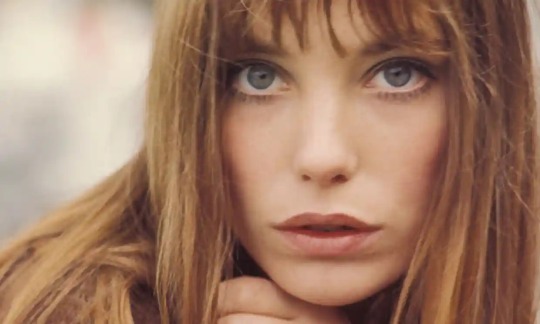
Jane Birkin, actor and singer, dies aged 76
Best known for the sexually explicit 1969 hit Je t’aime … moi non plus, she found fame in her adopted France
The British-born actor and singer Jane Birkin has been found dead at her home in Paris, the French culture ministry said on Sunday.
Birken, 76, was best known overseas for her 1969 hit in which she and her lover, the late French singer-songwriter Serge Gainsbourg, sang the sexually explicit Je t’aime … moi non plus.
Birkin found fame in her adopted France, catapulted into the public eye by her turbulent relationship with Gainsbourg. Her heavily accented French became her personal style signifier.
She crossed the channel in 1968 at the age of 22 to star in a film alongside Gainsbourg, who was 18 years her senior. It was the start of a 13-year relationship that made them France’s most famous couple, in the spotlight as much for their bohemian and hedonistic lifestyle as for their work.
The doe-eyed Birkin, with her soft voice and androgynous silhouette, quickly became a sex symbol, recording the steamy Je t’aime … moi non plus with a growling Gainsbourg. Banned on radio in several countries and condemned by the Vatican, the song was a worldwide success.
“He and I became the most famous of couples in that strange way because of Je t’aime and because we stuck together for 13 years and he went on being my friend until the day he died. Who could ask for more?” Birkin told CNN in 2006.
“So Paris became my home. I’ve been adopted here. They like my accent,” she said.
Birkin was born in London on 14 December 1946 to an actor mother and naval officer father. At 17, she married the James Bond composer John Barry, with whom she had a daughter, Kate, but the marriage lasted only three years.
She made waves in her film debut in 1966 with a full frontal nude scene in the swinging sixties classic Blow-Up by Michelangelo Antonioni.
After meeting Gainsbourg, 18 years her senior, in Paris on the set of a romantic comedy – he was her co-star – she moved to France permanently. Their musical and romantic relationship was tempestuous. During one of their raging rows, Birkin launched herself into the River Seine after throwing a custard pie in Gainsbourg’s face.
They had a daughter, Charlotte, who became a hugely successful actor and singer.
Birkin finally walked out on France’s favourite bad boy in 1980 and went on to to blaze her own trail. In cinema, she branched out from more ditsy roles to arthouse productions, gaining three nominations at the Césars – France’s Oscars – starting with La Pirate in 1985.
In her about 70 films she has been directed by France’s leading directors, including Bertrand Tavernier, Jean-Luc Godard, Alain Resnais, James Ivory and Agnès Varda.
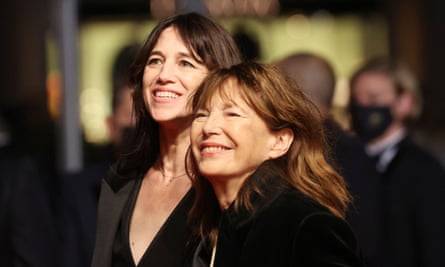
A chronic alcoholic, Gainsbourg died of a heart attack in 1991 aged 62. A few years earlier, he was in the audience to hear Birkin perform her first solo concert at the age of 40 at the Bataclan theatre in Paris.
In 1998 came her first record without Gainsbourg, Á la Légère. But she repeatedly returned to his repertoire, singing his hits around the world accompanied by a full orchestra, including in 2020 in New York where she performed with Iggy Pop.
The English rose of French chanson became something of a national treasure, who preserved the accent that made the French swoon throughout her life and an endearing air of fragility.
Her life was marked by tragedy, with her eldest daughter Kate Barry, a photographer, apparently committing suicide in 2013. She had leukaemia in the late 1990s and in 2021 suffered a minor stroke.
With her flared jeans, mini-dresses and messy bangs, Birkin was the ultimate It girl in the 1970s. In 1984, Hermès named one of its handbags after her. She was made an Officer of the Order of the British Empire (OBE) in 2001 for her services to acting and British-French cultural relations.
Besides Charlotte and Kate, she had another daughter, the singer Lou Doillon, from her 13-year relationship with the French director Jacques Doillon.
RIP Jane
26 notes
·
View notes
Text
Ant,
My courtship with Penelope is going fantastic this currently a source of great joy and great frustration. I am FRUSTRATED if you catch my meaning. If you do not, let me for safety sake clarify. Holding Penelope in my arms during our dances at balls and walking beside her during our promenades and watching her take in the world with her keen eyes at the museums has me almost at my wits end. Simply put her maid will not be able to stop me, should I put her over my shoulder and abscond with her to my home. I invited all three Featherington ladies to the Theatre Royal Covenant Garden Bridgerton Box thinking this would be enough and still I was so very close to getting charged with public indecency when the lights were turned down. Luckily Prudence opted to speak or I would have ended up crawling beneath Penelope's skirts and hoping the Orchestra was enough to drown out the sounds. Portia is chaos incarnate and would leave us alone just to see what happens and I assure what would happen would get us exiled from polite society. I know you are laughing at me but I don't care when I claim Penelope, I will do so as her damn husband. She will have my ring, my name and all the greed that lives in my bones. So get me a special license I plan to propose in five days. I want to be married no longer than a fortnight after. Portia has agreed already to the timeline as I know she can see how precarious my control is. My mother in law giggles every time she see me now, Anthony. I need you and mother to ensure I am not left alone with that walking temptation I wish to call my wife. We shall hold the wedding in my gardens I already have the gazebo almost completed and the catering and cake for wedding breakfast is already arranged. The flowers and music can be handled by mother and Portia. Our colors are sea foam and silver. Penelope already has her wedding gown and her trousseau ready. She prepared most of it during the off season rather than chance her mother contributing to it. I plan to propose during our outing at the Royal Menagerie at the Tower of London. I want my darling to see a proper menagerie not that sad attempt Debling tried to pass off to impress my beloved Pen. We want a small intimate wedding of family only. Eloise better get herself ready to be a bridesmaid, I am not above blackmail. I love you all but not one should expect to see us for at least a month but really closer 6 weeks. I have plans, Ant. We will see you in Aubrey Hall for the birth of our nibling. I know you are all leaving in a month. I know we will talk later this evening but I will probably catch sight of Penelope from your home and all my thoughts will go up in smoke.
Losing my mind,
Your most charming brother
Anthony falls out of his chair and ends up halfway under his desk laughing. Never has he laughed so hard, he is actually wheezing in between deranged cackling and hysterical giggles. Damn, this is what Colin has reduced him to.
#bridgerton#polin#unhinged colin bridgerton#anthony bridgerton#penelope featherington#violet bridgerton#benedict bridgerton#bridgerton s3#eloise bridgerton
10 notes
·
View notes
Text
Yesterday I watched Guys and Dolls at the bridge theatre in London, and it might genuinely be the best production of a musical I’ve seen. Not even mentioning how half the audience were “immersed”, meaning the stage rose up and moved around them, but in the small details, and just how much everyone was having the time of their lives. When nicely nicely finished sit down, he looked to the conductor of the orchestra and made them do an encore, and then once that encore finished he DID IT AGAIN. At the start of the second act Adelaide’s mic broke, and she ad libbed stuff like “oh the rest of the song is acapella huh” and “so this is the part where I tell you my life story”. Everyone was so funny. At the end after the bows the stage turned into a dance floor and the immersive audience danced with the cast. Actors sold bagels on stage before the show began. Idk it was so so so good.
10 notes
·
View notes
Text
Audra McDonald at the London Palladium premieres tonight, Friday, May 17, 2024 at 9:00 p.m. EST as part of PBS's Great Performances.
About the Episode
Premieres Friday, May 17 at 9 p.m. on PBS (check local listings), on pbs.org/gperf and the PBS App
The winner of a record-breaking six Tony Awards as well as two Grammy awards and an Emmy, Audra McDonald performs a repertoire of classic Broadway songs, including “I Am What I Am,” “Cornet Man,” “Summertime,” “I Could Have Danced All Night” and many more. Recorded from the London Palladium, musical director Andy Einhorn leads the 40-piece London Musical Theatre Orchestra to accompany McDonald.
youtube
AUDRA MCDONALD VS BERNADETTE PETERS: VOTE HERE
#broadway#audra mcdonald#musical theatre#broadway divas#i will be watching and sobbing the whole time#Youtube
4 notes
·
View notes
Text
Joe Bonamassa - Live At The Hollywood Bowl With Orchestra
Release Date: 21 Jun 2024

If you would like to hear an unparalleled blend of blues, rock, and orchestral majesty, then check out Joe Bonamassa's new album, 'Live At The Hollywood Bowl'. This recording immortalises Joe's first-ever performance at the iconic Hollywood Bowl in August 2023, accompanied by an impressive ensemble of 40 orchestra members.
Live At The Hollywood Bowl With Orchestra showcases elevates Joe' s fan-favourite tracks with grandiose orchestral arrangements by some of Hollywood's finest – David Campbell, Trevor Rabin, and Jeff Bova.
Joe says, “Very few gigs represent my journey in music more than the Hollywood Bowl. I moved to Los Angeles in 2003 in search of opportunity, and cheaper rent than New York City. My first gig at The Mint was attended by 5 of my friends and that's all. We have played The Greek Theatre many times since, but the Bowl has always been a dream. The orchestra and the sheer scale of the event and venue is something I will never forget. I am so grateful that we filmed this special event in my life.”
Producer Kevin Shirley says, "With a master practitioner like Joe Bonamassa on guitar, studio ingredients become magic live. Embracing the challenge of surpassing previous concerts, we aimed high for the Hollywood Bowl, incorporating orchestral maestros like David Campbell and Trevor Rabin. The result is a cinematic celebration of Joe’s music, a testament to his unparalleled standing in the blues-rock realm."
Bonamassa's Hollywood Bowl performance was a “bucket list” event that further cements his status as a leading figure in modern blues-rock. The project represents yet another pinnacle in Bonamassa’s career, encapsulating the magic of a live performance where every note resonates with the energy of a musician at the peak of his powers.
Bonamassa's impact on the blues-rock genre is immeasurable. Guitar World has hailed him as "the world's biggest blues guitarist," a testament to his skill, influence, and role in bringing blues-rock to the forefront of the music scene. With a career spanning over three decades, Bonamassa has consistently captivated audiences around the globe with his dynamic live performances and musical ingenuity.
Joe will be playing at London's Royal Albert Hall on April 4th & 5th next year.
2 notes
·
View notes
Text
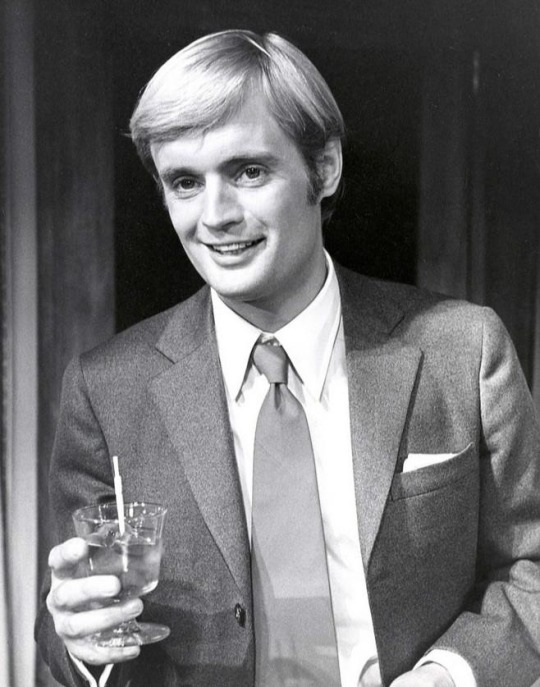
Remembering David McCallum- Scottish actor and musician.
David McCallum, who became a heartthrob in the hit series ‘The Man From U.N.C.L.E.,’ Dies at 90 💔 So sad a fine actor a great talent and a true gentleman.
An experienced character actor, he found fame in the 1960s as the enigmatic Illya Kuryakin. The British actor who played the mysterious secret agent Illya Kuryakin alongside Robert Vaughn’s Napoleon Solo in the 1960s hit spy drama The Man From U.N.C.L.E. was a secret international counterespionage and law-enforcement agency called U.N.C.L.E. (United Network Command for Law and Enforcement). The series premiered on September 22, 1964, and completed its run on January 15, 1968. The role turned the actor into a global sex symbol.
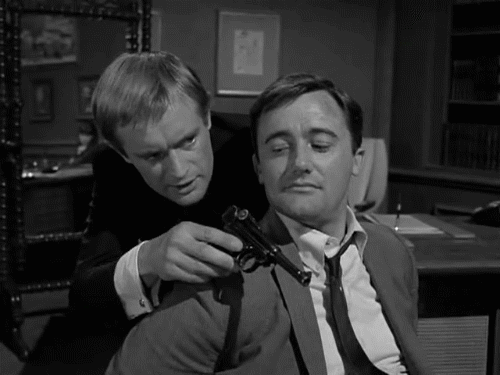
The success of the James Bond books and films had set off a chain reaction, with secret agents proliferating on both large and small screens. Indeed, Bond creator Ian Fleming contributed some ideas when the series was being developed, according to Jon Heitland’s book, The Man From U.N.C.L.E.: The Behind-the-Scenes Story of a Television Classic (special introduction by Robert Vaughn)
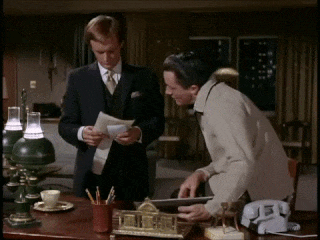
David McCallum took his place among one of the most iconic casts Hollywood ever assembled, nothing in the film’s title, The Great Escape, He was playing naval officer Eric Ashley-Pitt in the 1963 Second World War epic about the mass escape of British and Commonwealth POWs from German Stalag Luft III camp, through another POW turn in Colditz (1972-1974).
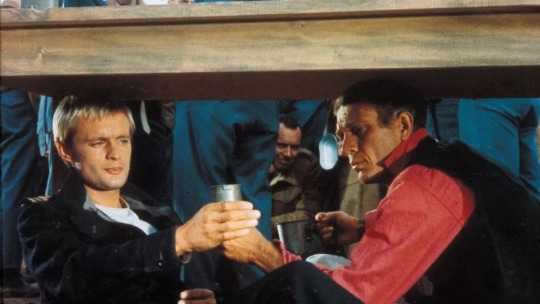
David McCallum with Steve McQueen on the set of the WWII epic. The Great Escape brought him to a US audiences. (Image: Moviestore/REX/Shutterstock)
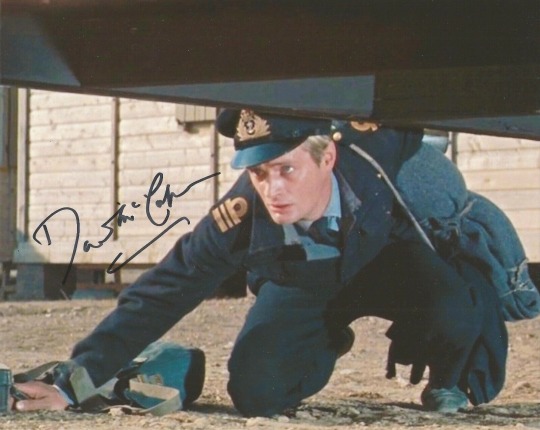
In 1975, he had the title role in a short-lived science fiction series, “The Invisible Man,” and from 1979 to 1982 he played Steel in a British sci-if chiller “Sapphire and Steel” (1979-1982). Over the years, he also appeared in guest shots in many TV shows, including “Murder, She Wrote” and “Sex and the City, a romantic comedy-drama television series filmed in New York.
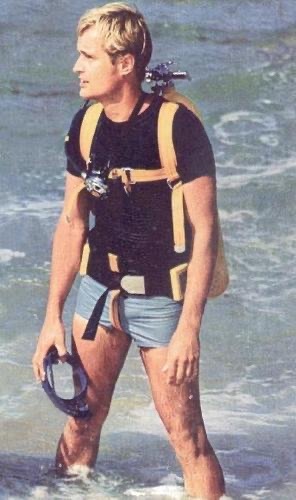
Later, in the 2000s as an eccentric medical examiner on “N.C.I.S.” he reached a new audience as Dr Donald "Ducky" Mallard, the medical examiner in US TV drama NCIS. McCallum was known for playing a pathologist on the hit CBS TV programme NCIS, which went on to generate several spinoff series, for twenty years. NCIS is the third-longest-running scripted, non-animated primetime television series in the U.S that is currently on air.
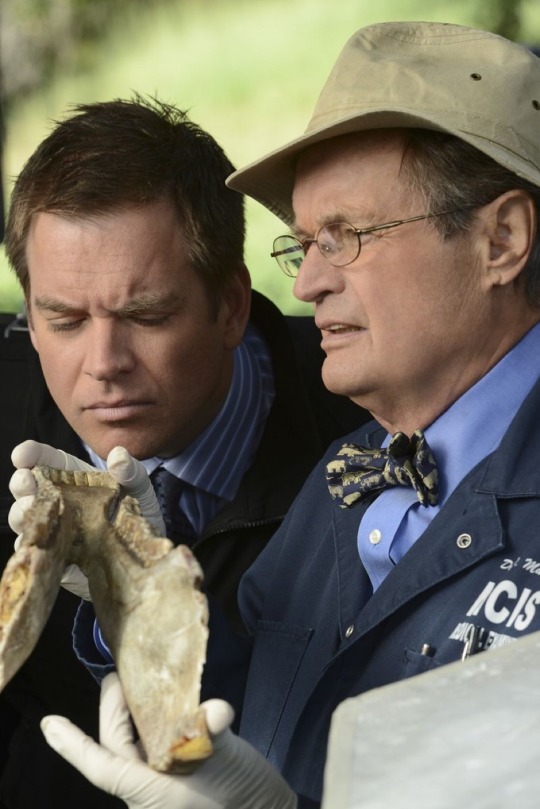
He was a true Renaissance man — he was fascinated by science and culture and would turn those passions into knowledge. For example, he was capable of conducting a symphony orchestra and (if needed) could perform an autopsy, based on his decades-long studies for his role on NCIS.

The Scottish-born actor died in New York on Monday 25th September 2023. He lived in Manhattan. David Keith McCallum was born on 19th September 1933 in the Maryhill (Scots: Maryhull - Scottish Gaelic: Cnoc Màiri) area of Glasgow, to a father who was the first violinist for the London Philharmonic and a mother who was a cellist.
David won a scholarship to the University College School in north London and took up the oboe with a view to a classical music career. Thus he originally pursued a career in music, training on the oboe and studying for a time at the Royal Academy of Music, though he soon left and enrolled at the Royal Academy of Dramatic Art. After RADA he started performing with repertory theatre companies.
David McCallum was drafted into the British military in 1951 and served two years, including 10 months in what was a small-arms expert. Not long after his discharge, he signed with the Rank Organization, a British production company, and began acting both in movies and on television.
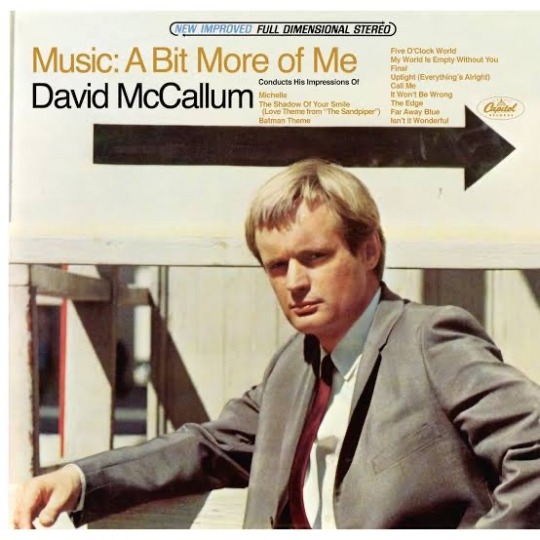
David McCallum a classically trained musician, created arrangements of popular songs of the day alongside a few original pieces and made four albums with forward-thinking producer and composer David Axelrod. Those groovy productions have been sampled a lot by trip-hop artists and more. In particular, “The Edge” from 1967’s
“The Edge” from 1967’s Music: For those who might have heard this song sampled elsewhere, you could have heard it in various places. From Masta Ace (“No Regrets”) to John Legend (“Actions”) his original was used in Edgar Wright’s Baby Driver, the 2017 film starring Ansel Elgort.
Check out the video below and listen for that familiar intro:
youtube
David McCallum - From The Man from U.N.C.L.E. to NCIS, and all performances in between, he was a multifaceted talent during 7 decades and 100 films and TV shows a True Legend.

R.I.P David 💔
1933-2023
#DavidMcCallum #Scottishactor #Britishactor #U.N.C.L.E. #IllyaKuryakin #TheGreatEscape #navalofficer #EricAshley #NCIS #secretagent #Edge #music #Ducky #DoctorMallard #actor #talent #gentleman #Legend #ripdavidmccallum
17 notes
·
View notes
Text

In the 1960s, there was one actor who could justifiably claim that ladies prefer blonds. As the secret agent Illya Kuryakin in the TV series The Man from UNCLE, David McCallum, who has died aged 90, received more fan mail from young women than any other actor in MGM’s history.
With his Beatles-style haircut, his liking for black turtleneck sweaters (which created a fad among viewers nationwide), and an aloof and enigmatic air, through which he sneaked a fair amount of charm and self-amusement, McCallum made Kuryakin into a sex symbol of the period. He provided a trendy contrast to Robert Vaughn’s Napoleon Solo, his fellow spy, who went in for expensive suits and ties.
Although Solo and Kuryakin worked perfectly in tandem, their personalities were at variance, the former being urbane, easygoing and sociable, the latter more reserved, intellectual and intense.
The James Bond film craze had already taken off when The Man from UNCLE series was launched in 1964, so US audiences were used to laidback heroes and their villainous nemeses. However, it was surprising to find a hip Russian alongside the good guys of United Network Command for Law and Enforcement fighting against the evil organisation THRUSH (an acronym for Technological Hierarchy for the Removal of Undesirables and the Subjugation of Humanity), during the cold war.
McCallum, who played Illya with the slightest Russian accent and an occasional Scottish lilt, was also known recently for his long-running role from 2003 in the popular CBS crime series NCIS.
He was born in Glasgow. His parents were classical musicians; his mother, Dorothy Dorman, a cellist, his father, David McCallum, a violinist and leader of the London Philharmonic Orchestra. McCallum Jr won a scholarship to University College school in Hampstead, north London, before being accepted at Rada, where he studied from 1949 to 1951, having given up his ambition, and his parents’ wish, to play the oboe professionally.
In 1951, McCallum managed to satisfy his love for both music and the theatre by landing the position of assistant stage manager at Glyndebourne opera. However, he was called up to do his national service in West Africa. Demobbed as a lieutenant, the 19-year-old McCallum headed for the theatre, which mainly meant stage-management jobs in rep.In 1956, he half-heartedly posted off some photographs of himself to the Rank Organisation, which was scouting for young talent. The photos were seen by Clive Donner, who was casting his first feature, The Secret Place (1957), and he invited McCallum to do a reading.
“Although he was nervous, his voice was firm, and he was very good,” Donner recalled. “I sat and looked at him for a long time. He was very skinny, with a marvellous head and huge eyes. I think he was living in a bedsit in Archway at that time and had little money. We put him under contract straight away.”
Obviously under the influence of James Dean, the leather-jacketed McCallum, playing a young punk involved in a heist, does his best to express teenage angst. In Cy Endfield’s gritty thriller Hell Drivers (1957), McCallum plays Stanley Baker’s brother, on crutches as a result of a crime. In the cast, as a waitress, was 20-year-old Jill Ireland. McCallum and Ireland were to marry a few months before the film’s release. Soon after, they played young lovers in Robbery Under Arms (1957), an adventure shot mostly in Australia. At that time, the couple were often pictured together in fan magazines.
It was back to British realism with Basil Dearden’s Violent Playground (1958), in which McCallum plays a juvenile delinquent gang-leader. Despite a mite too posh an accent, he makes a vivid impression with his drawn features and mop of fair hair.
There followed several more conventional supporting roles, such as radio operators, first on the Titanic in A Night to Remember (1958), and a jumpy one in an Elstree-studio Burmese jungle in the second world war drama The Long and the Short and the Tall (1961). He was even more nervy in John Huston’s Freud (1962) as one of the first of the psychoanalyst’s patients, a young man who assaulted his father because of an incestuous love for his mother.
After appearing as a sympathetic officer in Peter Ustinov’s Billy Budd (1962), McCallum went to Germany to make John Sturges’s The Great Escape (1963), the most expensive PoW picture of them all. Among a starry cast, headed by Steve McQueen, James Garner and Charles Bronson, McCallum held his own among the Brits as Eric Ashley-Pitt – “Dispersal – who devises a way of getting rid of dirt from the digging of an escape tunnel. But more significant for him was the fact that Ireland, who was with him during the shoot, fell for Bronson. Ireland and McCallum divorced; he later married Katherine Carpenter, while Ireland married Bronson.
McCallum, who was already making his principal career on television, was given the secondary role of Kuryakin in The Man from UNCLE, but was soon granted equal billing with Vaughn after it rapidly became clear that he had a huge fanbase. Alma Cogan recorded a song called Love Ya, Illya, which became a pirate-radio hit in Britain in 1966, and as late as 1991, an Argentinian funk duo named themselves Illya Kuryaki and the Valderramas, after McCallum’s character and the Colombian football player Carlos Valderrama.
The first feature-film spin-off from the TV series, To Trap a Spy (1965), in which McCallum had a minor role, did little business. But the second one, The Spy With My Face, co-starring McCallum, really lifted off, followed by the box-office hits One of Our Spies Is Missing, One Spy Too Many and The Spy in the Green Hat (all 1966), and How to Steal the World (1968).
After The Man from UNCLE finished in 1968, McCallum continued to make guest appearances on TV until his second long-running series, the BBC’s Colditz (1972-74), in which he played Flt Lt Simon Carter, a hot-headed RAF officer who is impatient to escape.
Subsequently, McCallum appeared and disappeared as a scientist in The Invisible Man (1975-76), a US TV production, and co-starred with Joanna Lumley in ATV’s spooky sci-fi series Sapphire and Steel (1979-82) as the eponymous extra-dimensional detectives sent to Earth to monitor threats to the time-stream.
McCallum was seldom off television screens over the next three decades, making the occasional sortie into films. He also did some theatre in New York, where he and his wife had settled, notably Julius Caesar in a Central Park production (2000), playing the title role as “a senile old man, suffering from ideas of grandeur” according to the actor; and portraying the Emperor Joseph II on Broadway in Peter Hall’s revival of Amadeus (1999-2000).
In 2003, his looks belying his age, McCallum began playing Dr Donald “Ducky” Mallard, chief medical examiner, in the TV series NCIS, following the cases of the fictional agents of the Naval Criminal Investigative Service. His research for the part included studying pathology and sitting in on autopsies. He stayed with the show for the rest of his life, appearing in all 20 seasons up until this year. In one episode, a character asks another what Ducky looked like when he was younger. “Illya Kuryakin” comes the reply.
McCallum is survived by Katherine, their son, Peter, and daughter, Sophie, and by his sons Val and Paul from his first marriage; Jason, his third son with Ireland, died in 1989.
🔔 David Keith McCallum, actor; born 19 September 1933; died 25 September 2023
Daily inspiration. Discover more photos at Just for Books…?
39 notes
·
View notes